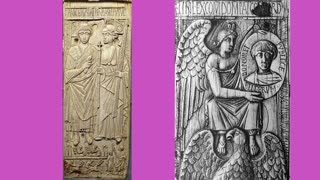Premium Only Content

Concordia rei publicae finibus de S. Augustini Civitate Dei contra paganos (Lib. XIX, Cap. 24)
https://www.zazzle.com/store/provaticanus?qs=augustine
An Excerpt from :
The City of God against the pagans:
By
Saint Augustine,
Bishop of Hippo:
Book 19,
Chapter 24.
Concerning:
The Definition Which Must Be Given of a People and a Republic, in Order to Vindicate the Assumption of These Titles by the Romans and by Other Kingdoms.
But if we discard this definition of a people, and, assuming another, say that a people is an assemblage of reasonable beings bound together by a common agreement as to the objects of their love, then, in order to discover the character of any people, we have only to observe what they love. Yet whatever it loves, if only it is an assemblage of reasonable beings and not of beasts, and is bound together by an agreement as to the objects of love, it is reasonably called a people; and it will be a superior people in proportion as it is bound together by higher interests, inferior in proportion as it is bound together by lower. According to this definition of ours, the Roman people is a people, and its good is without doubt a commonwealth or republic. But what its tastes were in its early and subsequent days, and how it declined into sanguinary seditions and then to social and civil wars, and so burst asunder or rotted off the bond of concord in which the health of a people consists, history shows, and in the preceding books I have related at large. And yet I would not on this account say either that it was not a people, or that its administration was not a republic, so long as there remains an assemblage of reasonable beings bound together by a common agreement as to the objects of love. But what I say of this people and of this republic I must be understood to think and say of the Athenians or any Greek state, of the Egyptians, of the early Assyrian Babylon, and of every other nation, great or small, which had a public government. For, in general, the city of the ungodly, which did not obey the command of God that it should offer no sacrifice save to Him alone, and which, therefore, could not give to the soul its proper command over the body, nor to the reason its just authority over the vices, is void of true justice.
Excerptum:
Sancti Aurelii Augustini
Episcopi Hipponensis
DE CIVITATE DEI CONTRA PAGANOS
Liber nonus decimus.
Romani ceterique populi et respublicae fuerunt – Caput vicesimum quartum.
Si autem populus non isto, sed alio definiatur modo, velut si dicatur: "Populus est coetus multitudinis rationalis rerum quas diligit concordi communione sociatus", profecto, ut videatur qualis quisque populus sit, illa sunt intuenda, quae diligit. Quaecumque tamen diligat, si coetus est multitudinis non pecorum, sed rationalium creaturarum et eorum quae diligit concordi communione sociatus est, non absurde populus nuncupatur; tanto utique melior, quanto in melioribus, tantoque deterior, quanto est in deterioribus concors. Secundum istam definitionem nostram Romanus populus populus est et res eius sine dubitatione respublica. Quid autem primis temporibus suis quidve sequentibus populus ille dilexerit et quibus moribus ad cruentissimas seditiones atque inde ad socialia atque civilia bella perveniens ipsam concordiam, quae salus est quodam modo populi, ruperit atque corruperit, testatur historia; de qua in praecedentibus libris multa posuimus. Nec ideo tamen vel ipsum non esse populum vel eius rem dixerim non esse rempublicam, quamdiu manet qualiscumque rationalis multitudinis coetus, rerum quas diligit concordi communione sociatus. Quod autem de isto populo et de ista republica dixi, hoc de Atheniensium vel quorumcumque Graecorum, hoc de Aegyptiorum, hoc de illa priore Babylone Assyriorum, quando in rebus publicis suis imperia vel parva vel magna tenuerunt, et de alia quacumque aliarum gentium intellegar dixisse atque sensisse. Generaliter quippe civitas impiorum, cui non imperat Deus oboedienti sibi, ut sacrificium non offerat nisi tantummodo sibi, et per hoc in illa et animus corpori ratioque vitiis recte ac fideliter imperet, caret iustitiae veritate.
Fontes: J.P. Migne, Patrologia Latina, Tom. 41, Col. 655-656
-
 4:49
4:49
ProVaticanus
18 days agoDiptychon Consulare Basilii, Consulis Ordinarii Anno 541 #SPQR #COS #Roma #541AD #ProVaticanus
12 -
 0:48
0:48
Buzzvideos - PT
4 years agoBottle cap Challenge contra calistenia
7 -
 0:39
0:39
ElUniversal
4 years agoMarcha contra abusos policiales
16.3K -
 3:00
3:00
WSYM
5 years agoConcordia - 5/4/20
6 -
 0:59
0:59
johnson2
4 years agoContra Anniversary Collection - Launch Trailer - E3 2019
77 -
 7:36:34
7:36:34
SpartakusLIVE
9 hours agoTiger Blood RESTOCKED and 30% off w/ code SPARTAKUS30
85.5K -
 24:58
24:58
Law&Crime
10 hours ago $3.24 earnedSecond Note Leaves Disturbing Clues in New York City Killings
38.9K12 -
 1:36:57
1:36:57
Badlands Media
1 day agoAltered State S3 Ep. 39: Earthquakes, Energy Games & the Fall of the Narrative
76.1K16 -
 2:04:07
2:04:07
Due Dissidence
15 hours agoCharlie Kirk's GAZA LIES, Caitlin Clark Stalker, Palantir Goes Hollywood - w/ Kyle Matovcik | TMWS
38.3K10 -
 2:54:43
2:54:43
I_Came_With_Fire_Podcast
16 hours agoAmerica First, Trump Threatens China, Your Friendly Neighborhood Illegal, EPA Gets a "W"
39.6K15